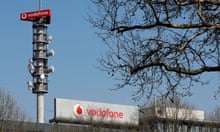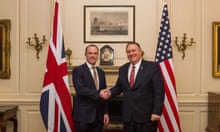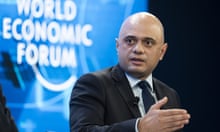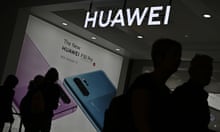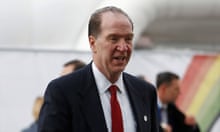The founder of Huawei has struck a defiant tone over the US government’s attempt to rein in the Chinese technology giant, claiming the crackdown has had little impact.
Speaking at the World Economic Forum in Davos, Ren Zhengfei said Huawei had shrugged off being blacklisted by the US last year. Ren also argued that Washington was unduly worried about the company, which he created 33 years ago, and which has been accused of spying for Beijing.
“Huawei was added to the [entity] list last year, and it didn’t hurt us that much,” Ren told an audience at WEF. “We basically withstood the challenges.”
The former People’s Liberation Army technologist added that he is not worried about future sanctions.
“This year the US might further escalate their campaign against Huawei, but I feel the impact against Huawei would not be very significant,” he said. “I am confident we can survive future attacks.”
Huawei was sanctioned last year, after US authorities concluded it was acting contrary to US national security or foreign policy interests.
Ren was introduced to his audience as “one of the most powerful and controversial founders of a tech company in the world”. But he rebuffed suggestions that his company was a threat. Instead, he argued that America should take pride in Huawei’s success – as its management system was cribbed from the US.
“Since day one we hired dozens of US consultancy firms, teaching us how to manage our business operations. The US should feel proud of that – they have US management systems being exported and implemented extensively by Huawei,” Ren said.
The UK government is currently weighing up whether to allow Huawei’s kit to be used in its 5G networks. One option is to restrict its technology to non-core elements. The US is pushing for Huawei to be blacklisted altogether, meaning Boris Johnson risks upsetting either China or the US.
The threat of a technology arms race, or a cold war between to major nations such as the US and China, looms over this week’s gathering in Davos.
John Chipman, director-general of the International Institute for Strategic Studies argued that countries must work together and agree universal standards for the next generation of connectivity products.
“Now is the time to work together to design universal standards for AI [artificial intelligence] and the networks that will follow 5G,” said Chipman, who gave a presentation on the issue to delegates.
“5G greatly increases risk of espionage and sabotage ... In the UK, the view is that risk can be managed.”
Some European countries such as France argue that high-speed mobile networks in the region should be underpinned by European manufacturers rather than Huawei.
Börje Ekholm, the president and CEO of Ericsson, denied that Huawei’s clashes with US authorities were good for rivals.
“It’s actually creating uncertainty in the market, reducing investments overall, so, I think the whole uncertainty that we have geopolitically is not a positive,” Ekholm told CNBC.

